I followed this answer to make https://localhost:3000/ work in Chrome & Mac. Today, it suddenly does not work anymore.
https://localhost:3000 gives Not Secure:
Subject Alternative Name Missing
The certificate for this site does not contain a Subject Alternative Name extension containing a domain name or IP address.
I re-trusted this certificate by following the previous steps, which didn't help. Then I saw this answer, about remaking ssl keys.
So I made v3.ext:
authorityKeyIdentifier=keyid,issuer
basicConstraints=CA:FALSE
keyUsage = digitalSignature, nonRepudiation, keyEncipherment, dataEncipherment
subjectAltName = @alt_names
[alt_names]
DNS.1 = localhost
Then,
openssl req -x509 -newkey rsa:2048 -keyout key.pem -out cert.pem -days 365 -sha256 -extfile v3.ext
However, it returns
unknown option -extfile
req [options] <infile >outfile
where options are
-inform arg input format - DER or PEM
-outform arg output format - DER or PEM
... ...
Does anyone know what's wrong with my openssl command?
Otherwise, does anyone know how to fix this Subject Alternative Name Missing or NET::ERR_CERT_COMMON_NAME_INVALID error?
Edit 1: I tried to follow this answer and here is my example-com.conf:
[ req ]
default_bits = 2048
default_keyfile = server-key.pem
distinguished_name = subject
req_extensions = req_ext
x509_extensions = x509_ext
string_mask = utf8only
# The Subject DN can be formed using X501 or RFC 4514 (see RFC 4519 for a description).
# Its sort of a mashup. For example, RFC 4514 does not provide emailAddress.
[ subject ]
countryName = Country Name (2 letter code)
countryName_default = US
stateOrProvinceName = State or Province Name (full name)
stateOrProvinceName_default = NY
localityName = Locality Name (eg, city)
localityName_default = New York
organizationName = Organization Name (eg, company)
organizationName_default = Example, LLC
# Use a friendly name here because its presented to the user. The server's DNS
# names are placed in Subject Alternate Names. Plus, DNS names here is deprecated
# by both IETF and CA/Browser Forums. If you place a DNS name here, then you
# must include the DNS name in the SAN too (otherwise, Chrome and others that
# strictly follow the CA/Browser Baseline Requirements will fail).
commonName = Common Name (e.g. server FQDN or YOUR name)
commonName_default = Example Company
emailAddress = Email Address
emailAddress_default = test@example.com
# Section x509_ext is used when generating a self-signed certificate. I.e., openssl req -x509 ...
[ x509_ext ]
subjectKeyIdentifier = hash
authorityKeyIdentifier = keyid,issuer
# You only need digitalSignature below. *If* you don't allow
# RSA Key transport (i.e., you use ephemeral cipher suites), then
# omit keyEncipherment because that's key transport.
basicConstraints = CA:FALSE
keyUsage = digitalSignature, keyEncipherment
subjectAltName = @alternate_names
nsComment = "OpenSSL Generated Certificate"
# RFC 5280, Section 4.2.1.12 makes EKU optional
# CA/Browser Baseline Requirements, Appendix (B)(3)(G) makes me confused
# In either case, you probably only need serverAuth.
# extendedKeyUsage = serverAuth, clientAuth
# Section req_ext is used when generating a certificate signing request. I.e., openssl req ...
[ req_ext ]
subjectKeyIdentifier = hash
basicConstraints = CA:FALSE
keyUsage = digitalSignature, keyEncipherment
subjectAltName = @alternate_names
nsComment = "OpenSSL Generated Certificate"
# RFC 5280, Section 4.2.1.12 makes EKU optional
# CA/Browser Baseline Requirements, Appendix (B)(3)(G) makes me confused
# In either case, you probably only need serverAuth.
# extendedKeyUsage = serverAuth, clientAuth
[ alternate_names ]
DNS.1 = localhost
# IPv4 localhost
IP.1 = 127.0.0.1
# IPv6 localhost
IP.2 = ::1
Then, I did
openssl req -config example-com.conf -new -x509 -sha256 -newkey rsa:2048 -nodes -keyout example-com.key.pem -days 365 -out example-com.cert.pem
Reopen https://localhost:3000 in Chrome gives me
localhost uses an unsupported protocol.
ERR_SSL_VERSION_OR_CIPHER_MISMATCH
Can anyone help?
